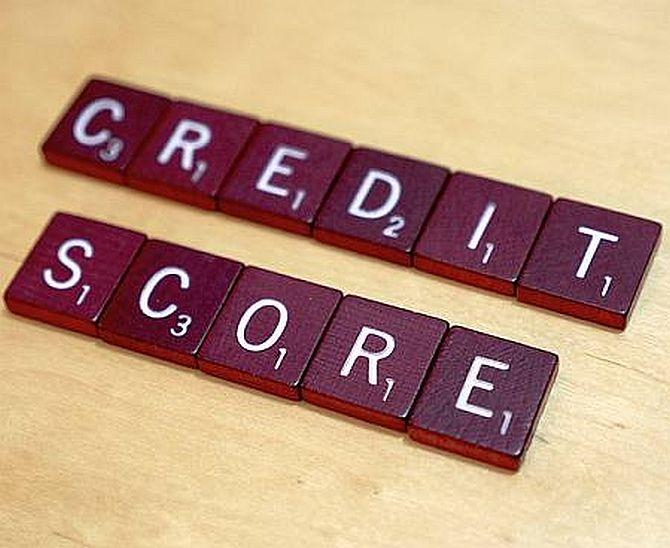An individual with a score above this level will not only enjoy easy access to credit, but will also benefit from lower cost of loans, points out Arun Ramamurthy, founder and director, Credit Sudhaar.

The credit score is perceived to be a reflection of one's capability to repay debt.
While this is indeed true, your credit score also affects your personal financial life in far more ways, which makes it important that you do your best to improve and maintain it at a high level.
In India the credit score ranges from 300 to 900.
A score of 750 is deemed to be good.
An individual with a score above this level will not only enjoy easy access to credit, but will also benefit from lower cost of loans.
In today's environment, lack of access to credit can affect your financial progress, while high cost of funds can have a negative impact on your cash flows.
The following five steps will help you improve your credit score.
Pay off credit card debt
Credit cards can be a great saviour in times of need.
However, most people are not aware that as the outstanding amount on a card inches closer to the credit limit, your credit score gets depleted.
This parameter has a 30% weight in the calculation of your credit score.
Higher utilisation of your credit limit leads to a lower score.
While the principal amount on a fixed-EMI loan comes down with each month of repayment, this does not hold true for credit card debt.
Since credit card providers allow a person to pay a flexible amount, a card holder may have a high level of exposure for a long time, which could in turn affect his score.
If you have a high level of outstanding on your credit card, resolve to pay it up.
Ideally, one should not utilise more than 30% of the limit on one's card.
A high level of credit outstanding not only affects the credit score, but also affects one's financial well-being.
As we all know, the interest charged on the outstanding on a credit card is the highest among all loans.
Reducing it will not only help improve your credit score but will also enable you to save money.
Avoid falling prey to impulse purchases
Marketers are known to draw up strategies to entice customers into buying their products on a sudden impulse.
However, resisting such temptations is important.
While you cannot avoid shopping completely, you need to follow a prudent process.
Think before you leap into purchasing an item.
For the next 12 months resolve to buy only what you need, and not stuff that is good to have.
Learn to distinguish between your needs and desires.
The funds saved thus can be utilised to pay off the amount outstanding on your credit card, or to make a lump sum prepayment on our personal loan or home loan.
Not only will this help you become debt free faster, it will also lead to improvement in your credit profile and credit score.
Review standing instructions
People often give standing instructions for their smaller, recurring expenses on their cards.
Resolve to review all the instructions that you have given in the past.
Monthly charges like those for gym membership, subscription to online magazines, and any other recurring charge for which you have given a standing instruction should be reviewed.
Cancel the ones that you do not utilise.
Even those that you do not utilise regularly, or those given on an impulse and no longer of much value should be cancelled.
This will reduce your credit card exposure and help you save money.
Automate repayments
This may sound contrary to what we suggested above, but what we are saying now is actually different.
The above suggestion is about revisiting expenses that you do not need.
Now we are saying that you should automate the payment of all bills that need to be paid.
The number of utility bills that have to be paid each month has multiplied.
Keeping track of all of them and paying them all on time can be quite a task.
The billing frequency also varies, due to which it is possible that you could miss out on paying one before the due date.
Hence, bills for utilities like electricity, phone, mobile, Internet, and so on should all be paid through auto deduction.
Not missing out on payments will help you achieve a better credit score.
Most importantly, you should automate the repayment of credit card dues.
Since the repayment date for this bill varies, managing it becomes difficult, and the chances of missing out on a payment are higher.
Automating repayment will help you save on the additional charges and interest that could be levied from you.
Sign up for credit monitoring
Most people who have only a passing familiarity with credit bureaus and credit scores may not be aware that one in four credit reports has an error.
These errors can jeopardise your credit profile, and spoil your chances of seamless access to credit at preferential rates.
Signing up for a credit monitoring service will help you keep a close watch on the status of your trade lines.
A credit monitoring service will also help you take corrective action if the need arises, and enable you to avoid perils like identity theft.
Cybercrimes are rampant these days and can lead to huge losses.
Credit monitoring will help you deal with these issues before they escalate.
By improving your credit score, you will be able to get loans more easily and also save money.
This extra amount can be invested to create a contingency fund, or you can channel it towards meeting financial goals like your child's higher education and marriage, or your own retirement.











